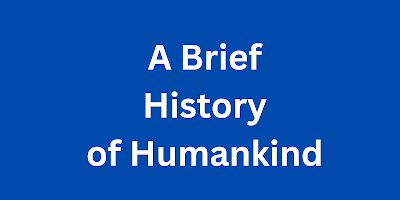"Sapiens: A Brief History of Humankind" by Yuval Noah Harari
"Sapiens," Harari takes readers on a sweeping journey through the history of humankind, from the emergence of Homo sapiens in Africa to the present day. Along the way, he explores the major developments and events that have shaped human history, including the Agricultural Revolution, the Scientific Revolution, and the rise of modern capitalism.
What makes "Sapiens" so compelling is Harari's ability to synthesize complex ideas and present them in a clear, accessible way. He offers insights into the ways in which humans have adapted to changing circumstances, from the development of language to the creation of complex societies and systems of government.
One of the strengths of the book is Harari's willingness to challenge conventional wisdom and offer new perspectives on familiar topics. For example, he argues that the Agricultural Revolution, often seen as a major step forward in human development, actually led to a decline in the quality of life for many people.
At the same time, "Sapiens" is not without its flaws. Some readers may find Harari's writing style to be overly simplistic, and others may take issue with some of his arguments or conclusions.
Overall, however, "Sapiens" is a thought-provoking and engaging book that offers a fascinating overview of human history. It is well worth reading for anyone interested in understanding the forces that have shaped our world and our species.
Here are some of the key words and concepts that the writer, Yuval Noah Harari, explores in "Sapiens: A Brief History of Humankind":
Homo sapiens: The species of humans that emerged in Africa about 300,000 years ago.
Agricultural Revolution: The transition from hunting and gathering to agriculture that occurred around 10,000 years ago.
Cognitive Revolution: The emergence of human language and symbolic thinking, which allowed for the development of culture, religion, and other aspects of human society.
Capitalism: The economic system based on private ownership of the means of production and the creation of goods and services for profit.
Empire: A large political entity that exercises control over multiple territories and peoples.
Scientific Revolution: The period of rapid scientific discovery and innovation that began in the 16th century and continues to the present day.
Globalization: The interconnectedness of the world's economies, cultures, and societies, made possible by advances in technology and transportation.
Religion: A set of beliefs and practices that shape human behavior and provide
Throughout the book, Harari offers insights and reflections on the history of humanity, from the emergence of Homo sapiens to the present day. Here are some key ideas and possible suggestions he presents in the book:
The importance of our collective myths: Harari argues that the success of Homo sapiens as a species is due in large part to our ability to create and believe in shared myths and stories, such as religion, nationalism, and money. He suggests that readers reflect on the myths that shape their own lives and societies, and critically examine their beliefs and values.
The impact of human activities on the environment: Harari warns that human activities, especially since the Industrial Revolution, have had a significant impact on the environment and the planet's future. He suggests that readers consider the consequences of their actions and lifestyles, and take steps to reduce their environmental footprint.
The challenges of modernity: Harari discusses the challenges that modern societies face, such as inequality, political polarization, and the rise of artificial intelligence. He suggests that readers think about these challenges and consider how to address them in their personal and social lives.
The limitations of human knowledge: Harari emphasizes that our knowledge and understanding of the world are always limited and subject to revision. He suggests that readers cultivate intellectual humility and curiosity, and be open to new ideas and perspectives.
The importance of empathy and compassion: Harari argues that human empathy and compassion are essential for creating a better world, and that they can be cultivated through education and practice. He suggests that readers strive to understand and empathize with people from different backgrounds and cultures, and work towards a more inclusive and just society.








.png)
.png)
0 Comments